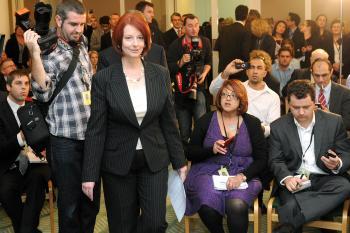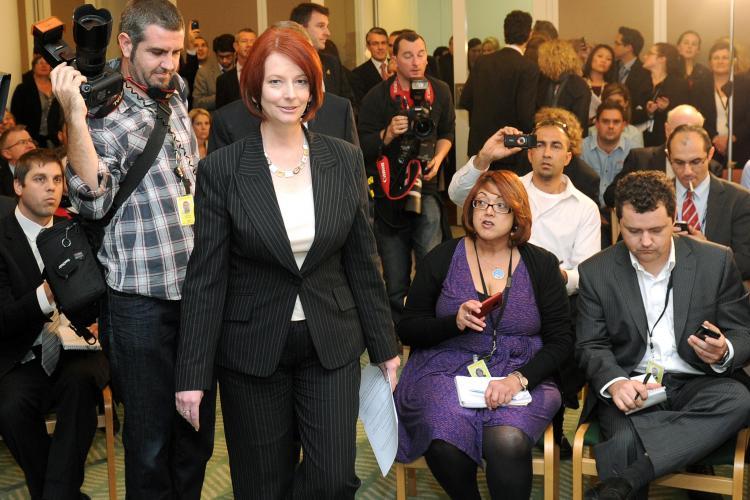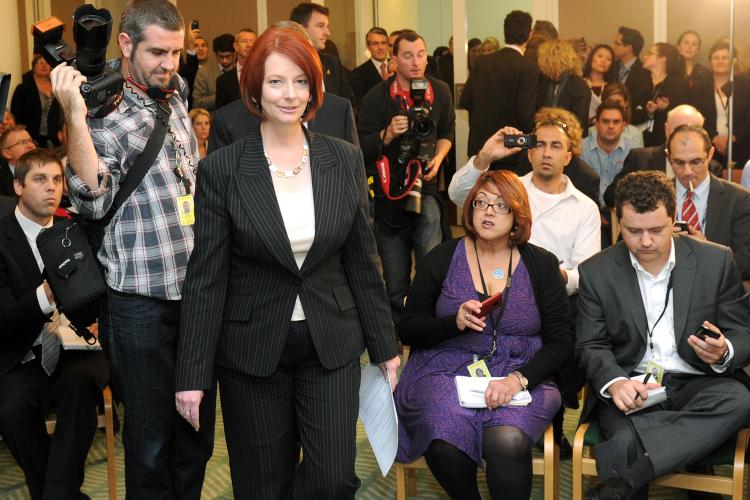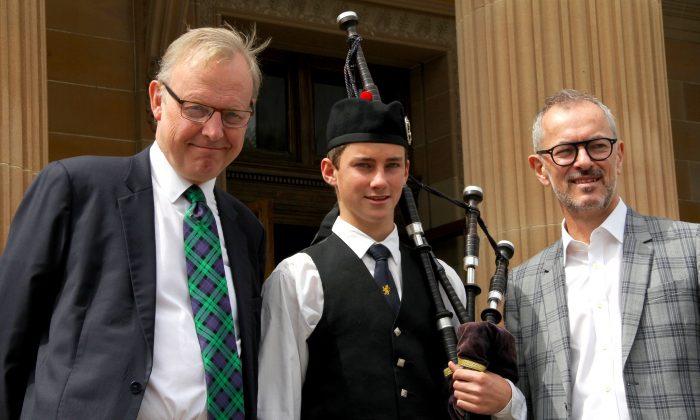SYDNEY—Australian Prime Minister Julia Gillard has it, while Kevin Rudd, the former prime minister didn’t. So say the pundits in analyzing the historic move by Australia’s Labor Party in removing Rudd as their leader and, accordingly, as prime minister of Australia.
The nation has been in shock since the announcement of Rudd’s demise on June 24, with the media finger pointing, accusing, and fear-mongering about the unions taking over.
Political analysts, however, are clear—Rudd slipped so badly in the polls that the Labor Party was fighting for its survival.
“We know that Labor was going to lose the election unequivocally in both the reported opinion polls and in their own internal party polls, which showed that they were headed, not just for defeat, but for a resounding defeat,” said Dr. Haydon Manning, Associate professor in the School of Political studies at Flinders University in South Australia.
“Their only alternative was to go to the Deputy Prime Minister Julia Gillard,” Manning said.
Commenting on the swiftness of the move and the fact that it had happened before Rudd completed his first three-year term as prime minister, Manning said that when a leader slips badly in the polls, “they are in grave trouble.” He added, “It is just the nature of domestic politics.”
Rudd did not understand how to run a government or indeed, how to work collaboratively with his colleagues, says Manning. “He had no idea. People were suspicious of that very early in his prime ministership and, of course, it took time for that suspicion to grow into raw fear about losing the election,” Manning said.
Ben Eltham, political analyst for New Matilda, says Rudd did not make the effort to cultivate back benchers and office bearers, leaving him without a support base when he most needed it.
“He has been disorganized, rude, and at times peremptory—not a recipe for personal support,” Eltham wrote.
Humble and gracious in defeat, his speech was heart-wrenchingly moving, passionate, and articulate, but only on his last day as prime minister did the Australian people get a chance to see the very human side of Rudd.
Julia Gillard has a very different style of leadership, but will she have the grit to lead the country? The 49-year-old Welsh-born lawyer believes she does. “Persistence” is her greatest strength, she told The Daily Telegraph.
Those that know her well say she will make an excellent leader, exhibiting all the skills that Rudd lacked in bringing a team together. Gone will be the “command and control” of Rudd’s leadership, says Christine Wallace, writer, and author of a forthcoming unauthorized biography of Gillard.
“She’s good at sensing the mood of the room, drawing people together, knocking heads together when she needs to,” she told ABC radio.
It was that sense that drove her to take the lead from Rudd. “A good government had lost its way,” Gillard said. It was time to act. From the very first day, she laid out her style of leadership, saying she would be working for the Australian people, that she was not frightened of hard work, but that she would be doing it collaboratively.
“I believe my track record as a member of parliament bears this out. ... I believe in consultation, I believe in getting the best,” she told the pack of reporters as she stepped up as the new prime minister.
As Australia’s first female prime minister and the first female leader of the Australian Labor Party, Gillard will be freer to define her own terms. However, she has spent three years as deputy to Rudd, and has been party to many of the unpopular decisions that the Rudd government made.
Many have said that she is warm and engaging, and she acknowledges that she has “never been a particularly stressed personality,” but she is also not afraid of a fight. She told Opposition Leader Tony Abbott that it was “game on” and she was serious, taking the points off both Opposition Deputy Julie Bishop and the wily Mr. Abbot in their attacks on her in her first parliamentary session as prime minister.
Understandably, her greatest supporters are her family, but if their aspirations are filled, then Australians can all hope to be better off under her leadership.
“Julia’s unique, hard-working, driven by noble ideals, wants to do good things for the country and [I am] hoping that we’ll go to a very close, hard-fought election as a united Labor Party, led by the first ever female prime minister,” her father John Gillard told the ABC.
He added, “I hope it will be a clean election. I hope that it will be fought on issues that confront the country, that it will not be a race to the bottom of the barrel.”
The earliest possible date for the next Federal election is August 7 and the latest is April 16, 2011.
The nation has been in shock since the announcement of Rudd’s demise on June 24, with the media finger pointing, accusing, and fear-mongering about the unions taking over.
Political analysts, however, are clear—Rudd slipped so badly in the polls that the Labor Party was fighting for its survival.
“We know that Labor was going to lose the election unequivocally in both the reported opinion polls and in their own internal party polls, which showed that they were headed, not just for defeat, but for a resounding defeat,” said Dr. Haydon Manning, Associate professor in the School of Political studies at Flinders University in South Australia.
“Their only alternative was to go to the Deputy Prime Minister Julia Gillard,” Manning said.
Commenting on the swiftness of the move and the fact that it had happened before Rudd completed his first three-year term as prime minister, Manning said that when a leader slips badly in the polls, “they are in grave trouble.” He added, “It is just the nature of domestic politics.”
Rudd did not understand how to run a government or indeed, how to work collaboratively with his colleagues, says Manning. “He had no idea. People were suspicious of that very early in his prime ministership and, of course, it took time for that suspicion to grow into raw fear about losing the election,” Manning said.
Ben Eltham, political analyst for New Matilda, says Rudd did not make the effort to cultivate back benchers and office bearers, leaving him without a support base when he most needed it.
“He has been disorganized, rude, and at times peremptory—not a recipe for personal support,” Eltham wrote.
Humble and gracious in defeat, his speech was heart-wrenchingly moving, passionate, and articulate, but only on his last day as prime minister did the Australian people get a chance to see the very human side of Rudd.
The New PM
Julia Gillard has a very different style of leadership, but will she have the grit to lead the country? The 49-year-old Welsh-born lawyer believes she does. “Persistence” is her greatest strength, she told The Daily Telegraph.
Those that know her well say she will make an excellent leader, exhibiting all the skills that Rudd lacked in bringing a team together. Gone will be the “command and control” of Rudd’s leadership, says Christine Wallace, writer, and author of a forthcoming unauthorized biography of Gillard.
“She’s good at sensing the mood of the room, drawing people together, knocking heads together when she needs to,” she told ABC radio.
It was that sense that drove her to take the lead from Rudd. “A good government had lost its way,” Gillard said. It was time to act. From the very first day, she laid out her style of leadership, saying she would be working for the Australian people, that she was not frightened of hard work, but that she would be doing it collaboratively.
“I believe my track record as a member of parliament bears this out. ... I believe in consultation, I believe in getting the best,” she told the pack of reporters as she stepped up as the new prime minister.
As Australia’s first female prime minister and the first female leader of the Australian Labor Party, Gillard will be freer to define her own terms. However, she has spent three years as deputy to Rudd, and has been party to many of the unpopular decisions that the Rudd government made.
Many have said that she is warm and engaging, and she acknowledges that she has “never been a particularly stressed personality,” but she is also not afraid of a fight. She told Opposition Leader Tony Abbott that it was “game on” and she was serious, taking the points off both Opposition Deputy Julie Bishop and the wily Mr. Abbot in their attacks on her in her first parliamentary session as prime minister.
Understandably, her greatest supporters are her family, but if their aspirations are filled, then Australians can all hope to be better off under her leadership.
“Julia’s unique, hard-working, driven by noble ideals, wants to do good things for the country and [I am] hoping that we’ll go to a very close, hard-fought election as a united Labor Party, led by the first ever female prime minister,” her father John Gillard told the ABC.
He added, “I hope it will be a clean election. I hope that it will be fought on issues that confront the country, that it will not be a race to the bottom of the barrel.”
The earliest possible date for the next Federal election is August 7 and the latest is April 16, 2011.






